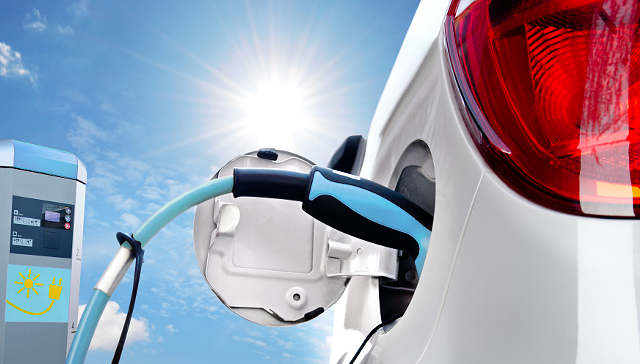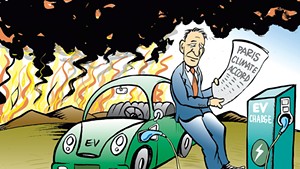
- Courtesy of the Transportation Climate Initiative
- Charging up
Vermonters would pay higher gas prices over the next decade but be better off financially if they were to join a 12-state effort to cap greenhouse gas emissions from transportation and invest in greener alternatives.
That’s the conclusion of a report released Tuesday by the Transportation and Climate Initiative, a group of Northeast and mid-Atlantic states working to create a “cap-and-invest” program for gasoline and diesel fuel suppliers.
“This program would lead to significant progress in meeting Vermont’s emission-reduction commitments,” said Peter Walke, deputy secretary of the Vermont Agency of Natural Resources.
There are 52 million registered vehicles in the District of Columbia and the 12 states exploring such a program. Transportation accounts for 44 percent of the region's carbon dioxide emissions, according to the group.
Taking a regional approach to reducing emissions has been discussed for more than a decade. The initiative was officially launched in December of 2018.
Tuesday was the first time the group released plan details, which include projections of gas price increases and the revenue states might receive for investing in emissions-reduction projects.
Gas dealers would be required to buy “allowances” through an auction system. They are expected to then pass those costs on to consumers with higher prices at the pump.
Fuel prices would likely increase 5 cents to 29 cents per gallon over a decade due to the program, according to Walke. It would raise an estimated $1.4 billion to $5.6 billion in 2022 for all the states combined.
Vermont’s share of that revenue would be approximately $20 million to $90 million per year, depending on emissions reduction goals, said Walke, Gov. Phil Scott’s point person in the discussions.
All New England states are considering participating, as are New York, New Jersey, Pennsylvania, Maryland, Delaware and Virginia.
New Hampshire Gov. Chris Sununu said Tuesday that his state would not be joining the Transportation and Climate Initiative. Vermont Gov. Scott agreed to explore the idea but has yet to take a position.
“The governor has told me and members of the press that he wants to see the details and that he’s been withholding judgement until he understands what it all means,” Walke said. “And now we’ve got those details and we can sit down and have a conversation with the governor and with the rest of Vermont about what this means.”
Scott has opposed a so-called “carbon tax” on fossil fuels, but the program is not technically a tax. Critics have nevertheless labeled it a “stealth carbon tax.”
Senate President Pro Tem Tim Ashe (D-Chittenden) said Vermont already participates in a successful regional program to reduce emissions from the energy sector, and tackling transportation is a logical extension of that approach.
The governor and the legislature have both committed to reducing the state’s emissions, and the Transportation and Climate Initiative appears to offer the state a way to make badly needed progress toward goals such as those set in the Paris Agreement on climate change.
Ashe said he had yet to digest all the details, but he commended Scott for putting top people in his administration at the negotiating table as details of the program came together.
“My hope is that, when all is said and done, if it’s a good deal for Vermont, we’ll all be on the same page,” Ashe said.
While the governor has the authority to join the program, high interest by lawmakers means any decision to do so would involve them, Walke said.
Wholesalers of gasoline and diesel fuel have ways to reduce the emissions from the fuel they sell, Walke said. This includes blending biofuel into their products. They can also sell different fuels, like hydrogen or electricity, or purchase carbon offsets, he said.
Emissions from fuel use are expected to fall by about 19 percent over the next decade without the cap-and-invest program. That assumes fuel efficiency standards continue to improve and the transition to electric vehicles continues to accelerate.
In addition to helping address climate change, the group predicts the drop in emissions will have several positive health impacts. Less air pollution will reduce deaths from asthma. People will get more exercise as they walk and bike more. Traffic accident deaths would drop, the group claims.
The group also estimates that despite the increased fuel costs, the overall program would result in a net financial gain for residents of the participating states. That’s due to the millions that would be invested in green programs in the state, and because increased use of more efficient transportation methods, like public transit or electric vehicles, will save people money, Walke said.
Such estimates, however, are regional, not Vermont specific, Walke said. For a rural state like Vermont, where the reach of public transit is limited and the most popular vehicles are pickup trucks, that financial calculus might be different, Walke said.
That’s why the next step is a “Vermont specific analysis” of the program and lots of public input before a decision can be made about whether to join, he said.
“It’s critically important that we get feedback from Vermonters and folks around the region so that we can have a full conversation about whether this is the right program for Vermont and other states,” Walke said.












Comments (7)
Showing 1-7 of 7
Comments are closed.
From 2014-2020, Seven Days allowed readers to comment on all stories posted on our website. While we've appreciated the suggestions and insights, right now Seven Days is prioritizing our core mission — producing high-quality, responsible local journalism — over moderating online debates between readers.
To criticize, correct or praise our reporting, please send us a letter to the editor or send us a tip. We’ll check it out and report the results.
Online comments may return when we have better tech tools for managing them. Thanks for reading.